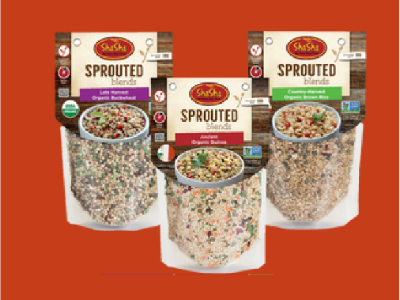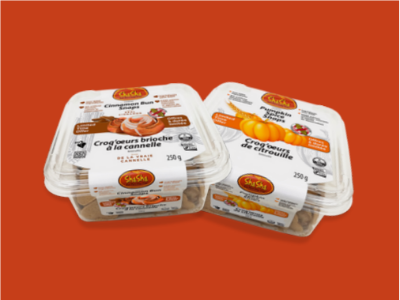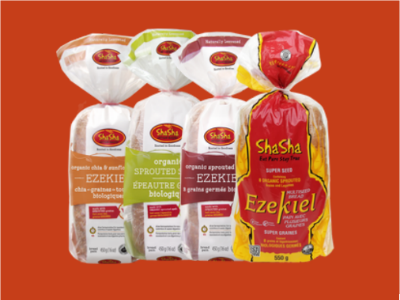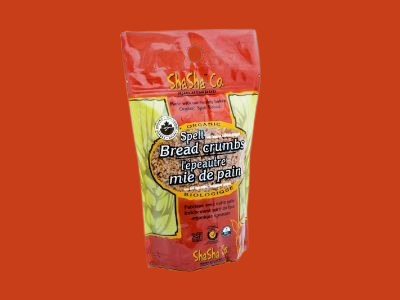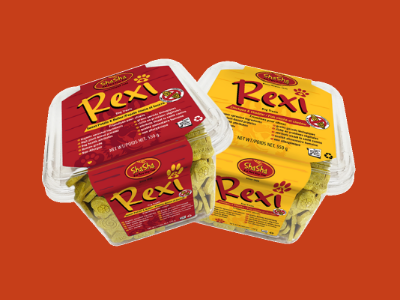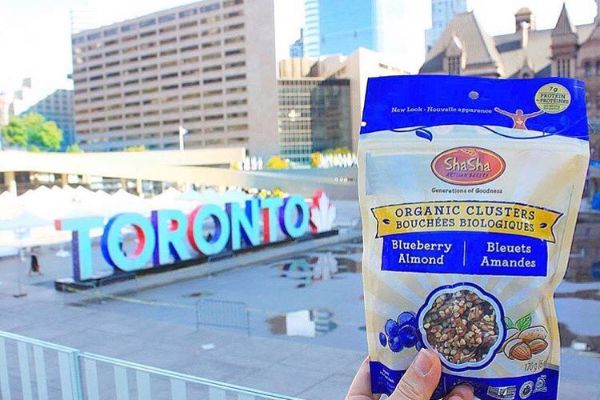Shasha Bread Co., the Toronto-based artisanal bakery founded by president ShaSha Shaun Navazesh, has launched Bio-buds, an exciting new line of organic products made with sprouted grains, legumes and pods.
ShaSha Co. sprouts their own grains, dehydrates them at peak nutrient value, and packages them with no additives or preservatives. The dehydrated sprouts are available on their own (you can use them in place of unsprouted grains, legumes and pods in your cooking), and as a key ingredient in Bio-buds functional cereals and snacks.
So why all the fanfare about sprouted products? Because they’re unbelievably good for you. Touted as one of the most nutrient-dense foods available, sprouts have more than three times the nutrients of unsprouted seeds. They are packed with bio-available (absorbable) vitamins, minerals, phytochemicals, and amino acids.
The heightened nutrient levels have to do with the process that occurs when a plant transitions from a dormant (seed) state to a living (sprouted) state. In the early stages of sprouting, seeds literally come to life, generating thousands of enzymes that are meant to give the fledgling plant a head start until it’s mature enough to take nutrients from the soil. Eating a plant at that stage gives us the benefit of all those enhanced nutrients; the active enzymes make it easy for our bodies to digest far more than we could get from eating non-germinated seeds. Absorbable nutrients increase, while calories and carbohydrates decrease.
“This is the food of the future,” says Navazesh. “There’s no down side. Basically, sprouts and sprout-based products are an all-natural nutrient delivery system that’s easy, absorbable and inexpensive.”
The nutritional benefits of sprouted foods are significant:
- Increased enzymes. In dry seeds, the enzymes are largely inactive. Enzyme inhibitors, which allow the seeds to last in the soil until they get enough moisture to germinate, also inhibit enzymes from being used by our bodies. However, once the seed has germinated/sprouted, those inhibitors are neutralized, and the enzymes become bio-available and easily digestible.
Those enzymes help us properly use the nutrients in the foods we eat:
- Amylase breaks down starch into more digestible forms, and converts proteins into amino acids and amides, which are the types of proteins our bodies can digest most easily.
- Lipase converts fats into beneficial fatty acids.
- Certain enzymes release polyphenolic compounds in the food, which react with free radicals to protect cells and slow down the aging process.
And here’s another indicator of increased digestibility; many people who can’t digest regular wheat bread often have no trouble with bread made with sprouted wheat. A little food for thought.
- More absorbable minerals. Due to the presence of phytates, a number of minerals that are present in whole grains can’t be absorbed by our bodies. Sprouting releases these minerals, and creates a higher quality food with nutrients that can be absorbed more readily.
- Overall higher nutrient count. Here’s an example taken from a research study conducted at the University of Minnesota (Alive, August 1995). When sprouted wheat was compared to non-sprouted wheat, the differences in nutrient levels were astounding. The sprouted wheat contained:
- 28% more vitamin B1 (thiamin)
- 315% more vitamin B2 (riboflavin)
- 66% more vitamin B3 (niacin)
- 65% more vitamin B5 (pantathenic)
- 111% more biotin
- 278% more folic acid
- 300% more vitamin C
- higher levels of enzymes including amylase, protease and lipase
And these results weren’t exclusive to wheat – other grains and legumes yielded similar numbers.
So what is sprouting, exactly?
Sprouting is the careful, time-consuming process of soaking, draining, and rinsing seeds until they germinate. ShaSha Co. has been doing their own sprouting since 1999; their purpose-designed facility is equipped with a modern sprouting system in which temperature, humidity and timing are carefully controlled for the best nutritional profile. Brown rice, mung beans, green lentils and adzuki beans are all sprouted in-house under optimum conditions for delicious, highly nutritious results.
Dedicated food scientists and technicians oversee the process. Through years of R&D, they have hit upon the ideal combination of timing and temperature. During the first 5-10 days of sprouting, plants are at their maximum nutrient density. That’s when ShaSha Co. dehydrates and retains them for use in Bio-buds products.
Passionate about making good food
Navazesh insists that everything his company produces be good for the body – and for the planet. It all has to be delicious, organic, natural, free of preservatives, nutritious, and it has to leave as small a carbon footprint as possible. If that sounds like a tall order, it is. But for this visionary entrepreneur, creating wholesome, nutrient-rich, foods is crucial. For that reason, ShaSha Co. has dedicated tremendous time and resources to the research and development of foods that meet all those criteria.
“As our lifestyles get increasingly faster-paced and more demanding, eating these powerhouse foods will help us stay healthy and function more efficiently,” says Navazesh.
Bio-buds are in stores now
Bio-buds products are now available at the ShaSha Co. retail store at 20 Plastics Avenue in Etobicoke, Ontario, and at a number of food stores across Canada. Specific retailers are listed on www.shashabreads.com or purchase online at www.shashaorganic.com.
ShaSha Co. is an artisanal bakery that combines ancient techniques with innovative methods to produce nutritious, wholesome, organic and natural products. The company concentrates on a few carefully developed products that contribute to a well-balanced, healthy lifestyle. They continuously research innovative methods of formulating and processing bio-friendly foods that taste great, offer maximum nutrition, and have minimal impact on the environment. For more information, please visit www.shashabread.com or call 416-255-0416.
Bio-Bud Adzuki Bean Sprouts Nutrition Information
Adzuki beans are a small red bean and often referred to as the “Mercedes”. Adzuki beans have been popular for centuries in Japan, Korea, Chins and Manchuria. In Japan Adzuki beans are pounded into a fine meal and used as a filling for cakes, confectionery and very often served as festival dishes on special occasions. It is also common to add flavoring to the bean paste, such as chestnut, also used to produce amanattō. Adzuki beans are about 25% protein and a rich source of lysine, amino acid. They contain all the amino acids except for tryptophan. Adzuki beans are also a rich source of iron, niacin and calcium. Sprouts are rich in digestible energy, bioavailable vitamins, minerals, amino acids, proteins, beneficial enzymes and phytochemicals, as these are necessary for a germinating plant to grow. These nutrients are essential for human health. To clarify, the nutritional changes upon germination & sprouting have been summarized below. Chavan and Kadam (1989) concluded that – “The desirable nutritional changes that occur during sprouting are mainly due to the breakdown of complex compounds into a more simple form, transformation into essential constituents and breakdown of nutritionally undesirable constituents.”
“The metabolic activity of resting seeds increases as soon as they are hydrated during soaking. Complex biochemical changes occur during hydration and subsequent sprouting. The reserve chemical constituents, such as protein, starch and lipids, are broken down by enzymes into simple compounds that are used to make new compounds.”
“Sprouting grains causes increased activities of hydrolytic enzymes, improvements in the contents of total proteins, fat, certain essential amino acids, total sugars, B-group vitamins, and a decrease in dry matter, starch and anti-nutrients. The increased contents of protein, fat, fibre and total ash are only apparent and attributable to the disappearance of starch. However, improvements in amino acid composition, B-group vitamins, sugars, protein and starch digestibilities, and decrease in phytates and protease inhibitors are the metabolic effects of the sprouting process.”
Increases in Plant Enzyme content
According to the naturopath and herbalist Isabell Shipard (Shipard, 2005) –
“Sprouts are a tremendous source of (plant) digestive enzymes. Enzymes act as biological catalysts needed for the complete digestion of protein, carbohydrates & fats. The physiology of vitamins, minerals and trace elements is also dependent on enzyme activity.”
“Being eaten whilst extremely young, “alive” and rapidly developing, sprouts have been acclaimed as the “most enzyme-rich food on the planet”. Estimates suggest there can be up to 100 times more enzymes in sprouts than in fruit and vegetables, depending on the particular type of enzyme and the variety of seed being sprouted. The period of greatest enzyme activity in sprouts is generally between germination and 7 days of age.”
“Grains and legume seeds of all plants contain abundant enzymes. However, while grains and seeds are dry, enzymes are largely inactive, due to enzyme inhibitors, until given moisture to activate germination. It is these inhibitors that enable many seeds to last for years in soil without deteriorating, whilst waiting for moisture. Enzyme inhibitors in some grains and legume seeds (for example trypsin inhibitors in raw soybeans and certain other beans and peas) need to be inactivated by heating or other processes, before they can be safely fed. However, heating, cooking and grinding processes can also inactivate certain digestive enzymes within grains and seeds. Fortunately, during germination and sprouting of grains and seeds, many enzyme inhibitors are effectively neutralized, whilst at the same time the activity of beneficial plant digestive enzymes is greatly enhanced.”
Increases in Protein Quality Chavan and Kadam (1989) stated – “Very complex qualitative changes are reported to occur during soaking and sprouting of seeds. The conversion of storage proteins of cereal grains into albumins and globulins during sprouting may improve the quality of cereal proteins. Many studies have shown an increase in the content of the amino acid Lysine with sprouting.”
“An increase in proteolytic activity during sprouting is desirable for nutritional improvement of cereals because it leads to hydrolysis of prolamins and the liberated amino acids such as glutamic and proline are converted to limiting amino acids such as lysine.”
Increases in Crude Fibre content Cuddeford (1989), based on data obtained by Peer and Leeson (1985), stated – “In sprouted barley, crude fibre, a major constituent of cell walls, increases both in percentage and real terms, with the synthesis of structural carbohydrates, such as cellulose and hemicellulose”. Chung et al. (1989) found that the fibre content increased from 3.75% in unsprouted barley seed to 6% in 5-day sprouts.”
Increases in Essential Fatty Acids
An increase in lipase activity has been reported in barley by MacLeod and White (1962), as cited by Chavan and Kadam (1989). Increased lipolytic activity during germination and sprouting causes hydrolysis of triacylglycerols to glycerol and constituent fatty acids.
Increases in Vitamin content According to Chavan and Kadam (1989), most reports agree that sprouting treatment of cereal grains generally improves their vitamin value, especially the B-group vitamins. Certain vitamins such as α-tocopherol (Vitamin-E) and β-carotene (Vitamin-A precursor) are produced during the growth process (Cuddeford, 1989).
According to Shipard (2005) – “Sprouts provide a good supply of Vitamins A, E & C plus B complex. Like enzymes, vitamins serve as bioactive catalysts to assist in the digestion and metabolism of feeds and the release of energy. They are also essential for the healing and repair of cells. However, vitamins are very perishable, and in general, the fresher the feeds eaten, the higher the vitamin content. The vitamin content of some seeds can increase by up to 20 times their original value within several days of sprouting. Mung Bean sprouts have B vitamin increases, compared to the dry seeds, of – B1 up 285%, B2 up 515%, B3 up 256%. Even soaking seeds overnight in water yields greatly increased amounts of B vitamins, as well as Vitamin C. Compared with mature plants, sprouts can yield vitamin contents 30 times higher.”
Chelation of Minerals Shipard (2005) claims that – “When seeds are sprouted, minerals chelate or merge with protein, in a way that increases their function.”
The nutritional value of Bio-Bud mung bean sprouts
Very modest green bean sprouts very common, but can not be underestimated. Maybe you do not know the nutritional value of mung bean sprouts number. Then come to tell you the following very humble green bean sprouts how high nutritional value Whichever.
Although the energy contained in low green bean sprouts, but rich in fiber, vitamins and minerals, there is beauty detox, Cellulite laxative, anti-oxidation effect. From the nutritional point of view, mung bean sprouts in the heat very low, per 100 grams of green bean sprouts contain only 8 calories Ka Road, and its wealth of cellulose contained in it can promote bowel movements, has laxative effect, these characteristics determine the mung bean sprouts have a role in weight loss. Therefore, to healthy weight loss, you can often choose the green bean sprouts side dish as a daily diet. Recommend a cold green bean sprouts here, practice is very simple, very suitable for cooking their own produce.
Partial cold and cool green bean sprouts, eat more easily defeated by cold and cool the stomach, therefore, is a deficiency disease, cold and dampness of the patients, such as chronic colitis, chronic gastritis, diarrhea and other diseases can not eat. Cooking should be accompanied by a little ginger or pepper wire, or the role of partial temperature of parsley, Jiu Huang and other fry, and it is in the cold. Also, when cooking green bean sprouts add some vinegar is best, it will give the coagulation of protein as soon as possible, eating up even more refreshing.
Second, the mung bean sprouts in addition to the normal “pass down” effects, or a nutritious vegetables. According to analysis, bean sprouts contain protein, fat, carbohydrate, vitamins, fiber, carotene, niacin and phosphorus, zinc and other minerals, therefore, often eating, nutrition will not appear a single situation. In addition, mung bean sprouts in the germination process, vitamin C, riboflavin will be a substantial increase, it is suitable for hot and cold and dry season is high due to deficiency of vitamin deficiency tongue sores go far human consumption.

